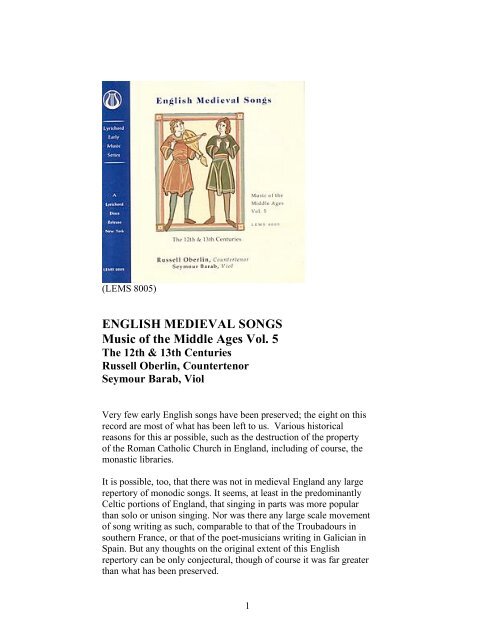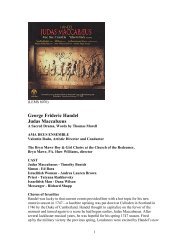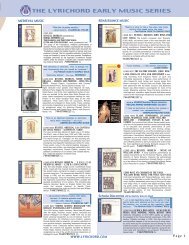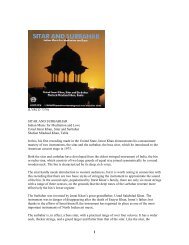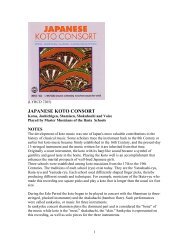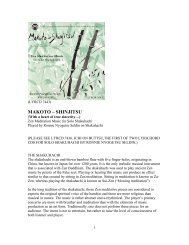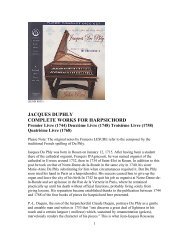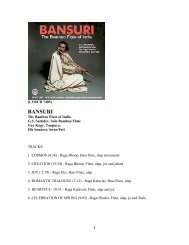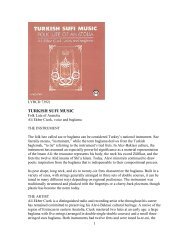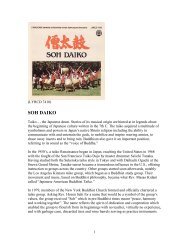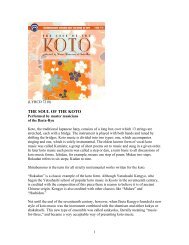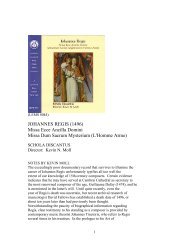8005 ENGLISH MEDIEVAL MUSIC - LEMS
8005 ENGLISH MEDIEVAL MUSIC - LEMS
8005 ENGLISH MEDIEVAL MUSIC - LEMS
You also want an ePaper? Increase the reach of your titles
YUMPU automatically turns print PDFs into web optimized ePapers that Google loves.
(<strong>LEMS</strong> <strong>8005</strong>)<br />
<strong>ENGLISH</strong> <strong>MEDIEVAL</strong> SONGS<br />
Music of the Middle Ages Vol. 5<br />
The 12th & 13th Centuries<br />
Russell Oberlin, Countertenor<br />
Seymour Barab, Viol<br />
Very few early English songs have been preserved; the eight on this<br />
record are most of what has been left to us. Various historical<br />
reasons for this ar possible, such as the destruction of the property<br />
of the Roman Catholic Church in England, including of course, the<br />
monastic libraries.<br />
It is possible, too, that there was not in medieval England any large<br />
repertory of monodic songs. It seems, at least in the predominantly<br />
Celtic portions of England, that singing in parts was more popular<br />
than solo or unison singing. Nor was there any large scale movement<br />
of song writing as such, comparable to that of the Troubadours in<br />
southern France, or that of the poet-musicians writing in Galician in<br />
Spain. But any thoughts on the original extent of this English<br />
repertory can be only conjectural, though of course it was far greater<br />
than what has been preserved.<br />
1
Nor, with so few examples, is it possible to come to any definite<br />
conclusions concerning the nature of this early English repertory.<br />
However a few things can be said. First, it would seem, as has already<br />
been suggested, that these English songs are not part of the lyric<br />
poetry movement that took place on the continent in the XIIth and<br />
XIIIth centuries, of that whole complex of ideas concerning poetry and<br />
song that came up out of Spain and spread through France and the<br />
northern countries. (This "complex of ideas" probably originated with<br />
the Arabs, though this contention, as well as that of placing the<br />
European origin in Spain, has been much debated.)<br />
However, it is much easier to say what these English songs are not<br />
than to say what they are. Throughout the Middle Ages English music<br />
of all kinds, most clearly English polyphony, was always very different<br />
from continental music. Though all musicians of the Middle Ages were<br />
working at a common problem, that is, the construction of a system of<br />
music for the expression of the Christian mysteries and the ideals of<br />
medieval Christendom, the English musicians made a solution of this<br />
problem that was strikingly different from that of the continental<br />
composers. (No doubt what must be behind this different solution is a<br />
very ancient, and pre-Christian, British concept of music, but no<br />
examples of that music have survived.) In English polyphony - part<br />
songs, motets, settings of the Ordinary of the Mass, conductus, etc. -<br />
this difference is clear and, because there is a good deal of material<br />
preserved, something can be said concerning the nature of it. But with<br />
English monody, where this amount of material is lacking, I can only<br />
venture to say this: that the modal formulas underlying most<br />
continental monody do not seem to be here. Of course English monody is<br />
modal, but the formulas making up the modes and used to construct it<br />
by continental composers, are not the same as those used in these<br />
English songs. Certainly some system underlies them, however, this was<br />
a thoroughly worked out and perfected system. That, it seems to me, is<br />
evident simply because the songs are as beautifully composed as they<br />
are.<br />
A NOTE ON THE LYRICS<br />
The selection of songs on this record comprises an unusually accurate<br />
cross section of the variety of lyrics remaining from one of the most<br />
musical centuries in English history, and in addition one group, the<br />
Godric hymns, represent the oldest English poetic tradition, while<br />
"Stond, wel, moder" undoubtedly is an example of the kind of sequence<br />
that developed eventually into the Mystery Plays, the earliest form of<br />
modern drama. Thus these pieces serve as a gateway between the<br />
literature of the far distant past (unfortunately, most of has been<br />
lost to us) and that of the present. Since they come from a time when<br />
2
lyric poetry was, as its name indicates, intended to be sung, it<br />
further delineates the roots of the richest poetic tradition of our<br />
time.<br />
Saint Godric, a native Englishman, was apparently one os the earliest<br />
of self-mad merchants. He started life as a peddler; eventually he<br />
became a ship-owner and traveller, and after visiting Rome, Jerusalem,<br />
and other holy places a pilgrim, he became a hermit near Durham, far<br />
north of his native Norfolk. The stanzas he wrote, two addressed to<br />
the Virgin, one to Christ and Mary, and one to St. Nicholas, are<br />
deeply moving in their simple sincere tone, and while they keep the<br />
ellipsis and word order of earlier times are called by George<br />
Saintsbury the beginning of modern English prosody. Presuming that<br />
these hymns, were as the medievals believe (to the extent that they<br />
were copied all over England), they must date from before 1170, the<br />
year if the saint's death. It is particularly touching that he should<br />
write one hymn to St. Nicholas, apparently Nicholas of Bari, whom we<br />
remember as Santa Claus (from the Dutch Sint Niklass), the patron of<br />
mariners and merchants. Although St. Nicholas has always been a<br />
popular saint, he must have been particularly notable to a merchant,<br />
mariner, and pilgrim of the 12th Century, for his body was stolen from<br />
Myrae and brought to Bari in 1087, thus Godric must certainly have<br />
visited his famous shrine.<br />
Many evangelical devices were used by the catholic Church in the<br />
middle ages; in addition to the ceremonies in the parish churches and<br />
the widely-distributed religious houses, friars would preach in the<br />
village squares much as do members of the Salvation Army today. The<br />
mass of material extant from that time is of a religious<br />
nature-sermons, saints' lives, exempla, etc. Two of the lyrics in this<br />
collection, "Man Mei Longe" and "Worldes Blis", seem to be rhymed<br />
sermons set to music. Each disparages worldly concerns and expresses<br />
the "you can't take it with you" attitude toward wealth. Both must<br />
have been very widely known about the middle of the XIIIth Century,<br />
for they are preserved in manuscripts dating that far back from<br />
various parts of England. The first stanza of "Man Mei Longe" is<br />
inserted in the famous Kentish sermon "Ayenbite of Inwit" while the<br />
other contains echoes of the 12th Century "Poema Morale". These<br />
occurences plus the nature of the manuscript-collections of moral<br />
works-in which the texts are found, indicates that they were among the<br />
best known moralizing lyrics of the day.<br />
Multitudes of medieval poems are addressed to the Virgin or to Christ,<br />
and a number commend on or describe the pathetic scene of Mary<br />
witnessing the crucifixion (See "Jesu Criste Milde Moder" in Volume 4<br />
of Music of the Middle Ages, <strong>LEMS</strong> 8004). "Sond Wel, Moder", although,<br />
3
like the others probably derivative of the Latin sequence "Stabat<br />
iuxta Christi crucem", tells the story in the words of Christ and<br />
Mary, and there is evidence that it was sung from the pulpit, perhaps<br />
antiphonally, but certainly with the participant taking the roles of<br />
the mother and son.<br />
"Bryd one Brere" is entirely different from the others in every<br />
respect. This love song was written on the back of a Bull of Pope<br />
Innocent III of 1199, and is preserved in King's College, Cambridge.<br />
Although it contains the exaggeration typical of conventional love<br />
songs (pity me or dig my grave), the song is full of the earthy<br />
details that make English medieval songs fresh and lively. The poet<br />
addresses a bird on a hawthorn, describing his love as courtly,white<br />
of limb, lovely, true, in a bubbling good humor that mocks the<br />
pretension and artificiality of courtly love, seems utterly<br />
spontaneous, and gives us a picture from the past of that rare<br />
creature of literature, a happy lover.<br />
Middle English (c1066-c1500) differs from Modern mainly in that the<br />
long vowels were sounded with the values they are given in continental<br />
European languages, and words were spelled exactly as they would have<br />
been sung, by a countertenor of the royal court, using expressions and<br />
pronunciations of other parts of the country, but with a London<br />
accent.<br />
-- WILLIAM BITTNER<br />
Section 1<br />
1. The St. Godric Songs<br />
(British Museum Ms. Reg. V,F. VII.) These are the earliest known<br />
songs in the English language. St. Godric died in 1170, so we may<br />
safely date these songs at approximately 1150. After a varied career,<br />
evidently including piracy. Godric retired into Wales, and spent the<br />
last forty or fifty years of his life as a hermit there. These four<br />
songs are preserved in a Latin biography of him written about twenty<br />
years after his death by a monk form a monastery near Godric's<br />
hermitage. From this biography we learn that the songs were dictated<br />
to St. Godric in visions, the biographer being present on these<br />
occasions. a) Crist and Sainte Marie: (transcription by Gustave<br />
Reese.) After Godric's repeated prayers to learn the fate after death<br />
of his sister's soul, she appeared to him accompanied by angels. The<br />
angels and a Kyrie (on this recording performed on the viol) and then<br />
Godric's sister sang to him of her happiness; at the end of the song<br />
the angels completed the Kyrie. In the original manuscript this<br />
4
alternation is clearly indicated. b) Sainte Marie Virgine: During a<br />
temptation of St.Godric by the Devil, the Virgin and St. Mary<br />
Magdalene appeared to him and sang this prayer, explaining that this<br />
song would said him in overcoming his temptations. c) Sainte Marie<br />
Cristes bur: There is no specific vision mentioned for this song.<br />
Perhaps, this being also a prayer to the virgin, the biographer meant<br />
to include it with Sainte Marie Virgine.<br />
d) Sainte Nicolaes Godes drud: Godric's biographer tells us that,<br />
during a visit to the hermitage, he was awakened one night by Godric's<br />
lusty singing. In the morning Godric explained that St. Nicholas, with<br />
a company of followers, had appeared to him, and their singing was so<br />
infectious that he had been compelled to join in.<br />
These four songs stand outside the problems discussed at the beginning<br />
of this article. Probably because of their veyr religious nature, they<br />
follow fairly closely the formulas of liturgical chant.<br />
2. Worldes blis ne last no throwe.<br />
(About 1260. Bodleian Library Ms. Rawlinson G. 18 Transription from<br />
the article on medieval song by J.A. Westrup, in the New Oxford<br />
History of Music, Volume II.) These long sermons in song seem to have<br />
been very popular in medieval England. There are a number of such<br />
poems extant, and, besides the two recorded here, a fragment of third<br />
(Mirie it is while sumer ilast) with music. That most of them had<br />
music once is quite possible. Certainly the effect of the repeated<br />
melody, as the poem continues, is extremely powerful. This melody is<br />
remarkable for its adherence to movement by step; rarely does an<br />
interval as large as third appear.<br />
3. Bryd one brere<br />
(About 1300 Cambridge, King's College muniments 2 W.32 The song is<br />
written on the back of a Papal Bull.)<br />
This song is the earliest English love lyric that has been preserved<br />
with its music. Those differences between English and continental<br />
monody discussed earlier in these notes are perhaps put forth more<br />
clearly in this song than anywhere on this record. A comparison of<br />
this song with the love lyrics of the Troubadours, Trouveres,<br />
Minnesingers, etc,. will show how unique this English music is.<br />
4. Man mei longe him liues wene<br />
(About 1270. Maidstone Ms. A 13. Transription by Manfred Bukofzer.)<br />
The subject matter of this songis closely related to that of Worldes<br />
blis ne last no throwe, the structure of its tune is quite different,<br />
5
older in outline and more dramatic in quality. Again, the repetition<br />
of the tune, plus the repeated exclamation "welaway", is powerfully<br />
contrived for the needs of the text.<br />
5. Stond wel moder under rode<br />
(About 1300) British Museum Ms. Royal 12 E 1. Transcription by Denis<br />
Stevens. The music for the last five verses of this song is not<br />
included in the original manuscript. The scribe was running out of<br />
room on his page, so he stopped including the music-evidently feeling<br />
that everybody knew the tune-and only wrote down the text. In the<br />
manuscript from Cambridge that also contains this piece, the page is<br />
torn away after the fifth verse. Consequently, the recording here had<br />
to be incomplete. However, the full text is given in the leaflet that<br />
accompanies this record.) The text of this song is one of the many<br />
English translations or adaptations of the Latin sequence Stabat iuxta<br />
Christi crucem, of which there are several musical settings also.<br />
(Jesu Cristes milde moder is one which can be heard in a two-part<br />
setting on <strong>LEMS</strong> 8004.) Each verse of the text is in two equal<br />
sections. The melody is the same for each section, but changes with<br />
each verse. In this way the composer has been able to build a long and<br />
beautifully sustained , melodic structure.<br />
Again, the questions concerning English monody discussed earlier do<br />
not apply to this song. The continental modal formulas are very much<br />
in evidence here, as might be expected since this a translation ofo a<br />
Latin sequence from the continent.<br />
(In cases where sources for transcriptions have not been given they<br />
are my own, as are also the accompaniments for tenor viol.)<br />
---SAVILLE CLARK<br />
Stond well moder as recorded here is based on a manuscript in the<br />
British Museum (Royal 12 e:i) which gives the complete literary text<br />
but only half the music, as the poem is a free Middle English<br />
translation of the Passiontide sequence Stabat Iuxta Christi Crucem<br />
(compare also Jesu Christes milde moder on EA-0024) it was thought<br />
that the melody might be borrowed from the sequence. Examination of<br />
the 13th century Sarum Missal in the Bibliotheque de l'Arsenal, Paris,<br />
proved this assumption to be correct. The first part of the melody<br />
agrees note for note with that of the six verses in the British Museum<br />
manuscript, and the latter part fits the remainder of the text<br />
perfectly. This affords ready proof of the close relationship between<br />
sacred and secular songs in the Middle Ages.<br />
--- DENIS STEVENS<br />
1<br />
6
A. CRISTE AND SAINTE MARIE<br />
Crist and Sainte Marie<br />
Swa on SCAMEL me ILEDDE Stool lead<br />
That ic on thisse erde NE SILDE, unshielded<br />
Wid mine bare fote ITREDIE. tread<br />
B. SAINTE MARIE VIRGINE<br />
Sainte Marie Virgine<br />
Moder Jesu<br />
Cristes Nazarene<br />
ONFO schild help thin Godric Receive shield<br />
Onfang bring hegelich<br />
With thein Godes RICHE. kingdom<br />
C. SAINTE MARIE CRISTES BUR<br />
Sainte Marie Cristes BUR bower<br />
Maidenes CLENHAD modernes FLUR cleanliness (of)/<br />
DILLIE min sinne rix in min MOD flower (of)<br />
Bring me to winne with the SELFD Efface mind<br />
God. very<br />
D. SAINTE NICOLAES GODES DRUD<br />
Sainte Nicolaes Godes drud<br />
Tymbre us faire scone hus darling<br />
At thi burth at thi bare Build polish<br />
Sainte Nicolaes bring us wel thare. bier<br />
2<br />
Worldes blis ne last no throw, short space of time<br />
hit WIT ant WEND a-wey a-non; departs goes<br />
The lengur that hich hit i-knowe<br />
The lasse hic finde PRIS ther-on, value<br />
for al hit is IMEYND syd kare, mixed<br />
mid sorewe ant wid UUEL fare, evil<br />
ant at the laste POUERE and bare poor<br />
hit let mon, wen hit ginnet a-gon. abandons begins<br />
al the blisse this here ant there<br />
BI-LOUKETH at HENDE WOP ANT MON. encompasses<br />
end lamentation<br />
Al shal gon that her mon HOWET, haves<br />
al hit shal wenden to NOUT; nought<br />
the mon that her no GOD NE SOWET, good sows (not)<br />
wen other repen he WORTH BIKAKT. will be beguiled<br />
thenc, mon, FORTHI wil thu hauest MYKTE, therefore<br />
might<br />
7
that thu thine GULTUS here ARIKTE, guilts aright<br />
ant WRCHE god bi day an nikte, work<br />
ar then thu be of LISSE ILAKT. before joy seized<br />
thu nost wanne crist ure DRIKTE lord<br />
the asket that he hauet bitakt. committed<br />
Al the blisse of thiss LIUE life<br />
thu shalt, mon, HENDEN IN WEP - end in weeping<br />
of HUSE ant home ant child ant WYUE. house wife<br />
SELI mon tak there-of KEP! simple care<br />
for thu shalt al BILUEN here relinquish<br />
the EYKTE were-of LOUERD thu were; possessions<br />
lord<br />
wen thu LIST, mon,up- on bere liest<br />
ant slepest a SWYTHE DRUYE slep very dreary<br />
ne shaltu haben wit the no FERE companion<br />
butte thine WERKUS on an HEP. deed heap<br />
Mon, wi SEESTU LOUE ant herte sets thou<br />
on worldes blisse that nout ne last?<br />
wy THOLESTU that te so ofte smerte endures thou<br />
for loue that is so unstedefast/<br />
thu LIKEST huni of thorn iwis, licks<br />
that seest thi loue on worldes blis<br />
for ful of BITTERNIS hit is. bitterness<br />
ful sore thu mikt ben OFGAST, terrified<br />
that despendes here HEIKTE amis, possessions<br />
WER-THURTH ben in-to helle icast. whereby<br />
Thenc, mon, war-of crist the WROUKTE wrought<br />
ant do wey PRUDE ant fulthe MOD. pride<br />
filthy mind<br />
thene wou DERE he the BOKTE dearly<br />
redeemed<br />
on RODE mit his swete blod; cross<br />
him-sef he gaf for the in PRIS. price<br />
to BUGE the blis yf thu be wis. buy<br />
BI-THENC the, mon, ant up aris consider<br />
of SLOVTHE, an-gin to worche god sloth<br />
WIL time to worchen is, while<br />
for elles thu art WITLES ANT WOD. else<br />
witless and mad<br />
Al day thu mikt understode<br />
ant ti MIROUR bifor the sen, mirror<br />
8
wat si to don an to WONDEN undertake<br />
ant wat to holden ant to FLEN; flee<br />
for al day thu sigst wid thin EGVEN eyes<br />
wou this world went ant wou men DEIGET. die<br />
that wite wel, that thu shalt dreigen suffer<br />
DET, al so an-other DET. death did<br />
ne helput nout ther non to LIGEN, lie<br />
ne may no mon BU det ageyn. be<br />
Ne wort ne god ther UNFORGULDE, unrequited<br />
ne non uuel ne worth UNBOUKT; unpunished<br />
wanne thu list, mon, UNDUR MOLDE under mould<br />
thu shalt hauen as tu hauest wrokt.<br />
bithenc the wel forthi; hic rede,<br />
ant clanse the of mine misdede,<br />
that he the helpe at thine nede,<br />
that so DURE hus haued iboukt, dearly<br />
ant so heuene blisse Iede<br />
that euere LEST ant failet nout. Amen endures<br />
3<br />
BRYD one brere, brid, brid one BRERE Bird briar<br />
KYND is come of loue, loue to CRAUE. Nature crave<br />
Blithful biryd, on me thu rewe pity<br />
Or GREYTH, lef, greith thu me my graue. prepare<br />
beloved<br />
HIC am so blithe, so BRYYIT brid on brere, I bright<br />
QUAN I se that HENDE in halle when gracious<br />
Yhe is QUIT OF LIME, louveli, trewe, white limb<br />
Yhe is fayr and FLUR of alle flower<br />
MIKTE hic at wille HAUEN might have<br />
Stedefast of loue, loueli, trewe,<br />
Of mi sorwe yhe may me SAUEN save<br />
Ioye and blisse were Eere me newe.<br />
4<br />
Man mei longe him lieues WENE, expect<br />
ac ofte him LIYET the wreinch; lies trick<br />
fair weder ofte him went to RENE, rain<br />
an ferliche maket is BLENCH. wonderfully<br />
sunshine<br />
thar-vore, man, thu the BITHENCH,- bethink<br />
al sel valui the grene. shall<br />
9
green (youth)<br />
wela-wey! nis king ne Quene<br />
that ne sel drinke of deth-is drench. death's draugh<br />
Man, er thu falle of thi bench,<br />
thu sinne aquench.<br />
Ne mai strong ne starch ne kene rigid<br />
AGLYE deth-is WITHER-CLENCH; escape<br />
hostile grasp<br />
yung and old and brith AN-SIENE, beautiful<br />
al he RIUETH an his streng. rends<br />
VOX and ferlich is the wreinch, ready<br />
in opposition<br />
ne mai no manthar TO-YENES, prayer<br />
wei-la-wei! ne iweping ne BENE, reward, craft<br />
leech's draugh<br />
mede, liste, ne leches dreinch.<br />
Man, let sinne and lustes stench,<br />
wel do, wel thench!<br />
Do bi SALOMONES REDE, Solomon's advice<br />
Man, and so thu SELTH wel do. shall<br />
Do al so he the TOTHE and sede taught<br />
what thin endinch the brinch to, ending<br />
New SELTU NEUERE mis-do. shalt-thou<br />
Sore thu MITH the a-drede, might<br />
weyla-wey! suich WENTH wel lede expectations<br />
long lif and blisse UNDER-UO, receive<br />
thar deth LUTETH in his SWO lurks shoe<br />
to him for-do<br />
Man FWI NELTU the bi-thenchen? why wilt thou not<br />
Man FWI neltu the BISEN? give heed<br />
of FELTHE thu ert isowe, filth<br />
WEIRMES METE thu selt ben. worms meat<br />
HER NAUEST TU BLISSE DAYS THRE, here havest thou<br />
not three blissful<br />
days<br />
al thi lif thu DRIST in wowe; suffer<br />
wela-wey! deth the sal DUN THROWEN throw down<br />
thar thu WENEST heye STE. suppose ascent<br />
In wo sal thi wele enden, welfare<br />
in WOP thi GLE. weeping glee<br />
Werld an wele the BI-PECHETH, deceive<br />
10
iwis HIE buth tine iuo; they<br />
if thi werld mid wele the SLIKET flatters<br />
that is far to do the wo.<br />
thar-fore let lust ouer-gon,<br />
man, and eft it sal the liken.<br />
Wela-wey! hu sore him wiket fails<br />
thar in one stunde other two time<br />
wurh him PINE euere-mo. pain<br />
ne do man swo!<br />
5 STOND WEL, MODER, UNDER RODE<br />
"Stond wel, moder, vnder RODE, cross<br />
bihold thi child wyth glade mode,<br />
blythe moder MITTU BEN", might thou<br />
"Svne, QUU may blithe stonden? who<br />
HI SE thin feet, hi se thin honden, I see<br />
nayled to the hard TRE." tree (cross)<br />
"Moder, do WEY thi wepinge; endure<br />
hi THOLE this ded for mannes thinge-<br />
for owen gilte tholi non."<br />
"Svne, hi fele the DEDE STUNDE, time of death<br />
the swerd is at min herte grunde,<br />
that me BYHYTTE symeon." Simeon foretold<br />
"Moder, reu vpon THI BERN! pity child<br />
thu WASSE awey tho blodi TEREN, wash tears<br />
it don me werse that me ded."<br />
"Sune, HU MITTI teres WERNEN? how might I<br />
restrain<br />
hy se tho blodi flodes HERNEN run<br />
HUTH of thin herte to min fet." out<br />
"Moder, nu y may THE SEYN, (to) say thee<br />
bettere is that ic one deye<br />
than al man-kyn to helle;<br />
"Sune, y se thi bodi SWNGEN, hanged<br />
thi brest, thin hond, thi fot THUR-STUNGEN- pierced<br />
no SELLI THOU me be wo." strange that<br />
"Moder, if y dar the tellen,<br />
yif y NE DEYE thu gost to helle; I die not<br />
hi THOLE this ded for thine sake." suffer<br />
"Sune, thu BEST ME SO MINDE, so mindful of me<br />
11
WITH me nout; it is me kinde reproach nature<br />
that y for the sorye make."<br />
"Moder, merci! let me deyen, redeem<br />
for adam ut of helle BEYN,<br />
and al mankin that is for-loren."<br />
"Sune, wat sal me to REDE? advise<br />
thi PINE pined me to dede, pain<br />
let me DEYN the bi-foren." die<br />
*"Moder, MITARSTthu mith leren,<br />
wat pine THOLEN that childre beren now for the first<br />
time<br />
wat sorwe hauen that childre beren (you) suffer<br />
wat sorwe hauen that child FOR-GON." lose<br />
"Sune, y wot y kan the tellen.<br />
BUTE it be the pine of helle except<br />
more sorwe ne WOTH y non." know<br />
* At this point in the original manuscript the music breaks off,<br />
therefore these 5 verses were not recorded<br />
"Moder, REU of noder kare!<br />
nu thu wost of moder fare,<br />
thou thu be clene mayden MAN." one<br />
"Sune, help alle at nede,<br />
alle tho that to me GREDEN- wail<br />
mayden,wyf and FOL wyman." foul<br />
"Moder, y may no legur duellen,<br />
the time is cumen y fare to helle,<br />
the thridde day y rise upon."<br />
"Sune, y wyle we'the funden,<br />
y deye ywis of thine wnden,<br />
so reuful ded was neuere non."<br />
When he ros that fel thi sorwe,<br />
the blisse sprong the thridde morewe,<br />
wen blithe moder wer thu tho.<br />
Moder, for that ilke blisse,<br />
bisech vre god, vre sinnes lesse, shield<br />
thu be hure CHEL ayen hure fo.<br />
Blisced be thu, quen of heuene,<br />
bring us ut of helle LEUENE flames<br />
thurth thi dere sunes mith.<br />
12
Moder, for that hithe blode<br />
that he sadde vpon the rode,<br />
led us in-to heuene lith. Amen<br />
The instrument used on this record is a tenor viol, with frets, made<br />
in England by Dolmetch.<br />
Note: Words and phrases in the original old English texts that might<br />
be difficult for the modern listener to understand are in bold print.<br />
Their translations appear at the right.<br />
Russell Oberlin, Thomas Hunter professor of music emeritus and<br />
director of the Collegium Musicum at Hunter College, is an<br />
internationally acclaimed singer widely recognized as America's<br />
foremost countertenor. A graduate of the Juilliard School of Music,<br />
Oberlin was founding member of the legendary New York Pro Musica.<br />
He had recorded extensively, given recitals, and appeared as soloist with<br />
leading orchestras throughout this country and abroad. Operatic roles<br />
include appearances at the Royal Opera House, Covent Garden, where he<br />
sang the part of Oberon in the London premiere of Benjamin Britten's<br />
"A Mid-Summer Night's Dream." A senior Fullbright research scholar,<br />
Oberlin had taught and lectured extensively in the U.S. and England.<br />
Cover Illustration, Lesley Anne Doyel<br />
Original LP issue produced, Beverly Merrill<br />
Recorded at Esoteric Sound Studios, NYC, Jerry Newman, eng.<br />
Digital remastering & Reissue produced by Nick Fritsch<br />
CD mastering, DSW Mastering Studios, NYC<br />
Originally issued on the Experiences Anonymes label in 1958 (catalog<br />
number EAS 29)<br />
13


